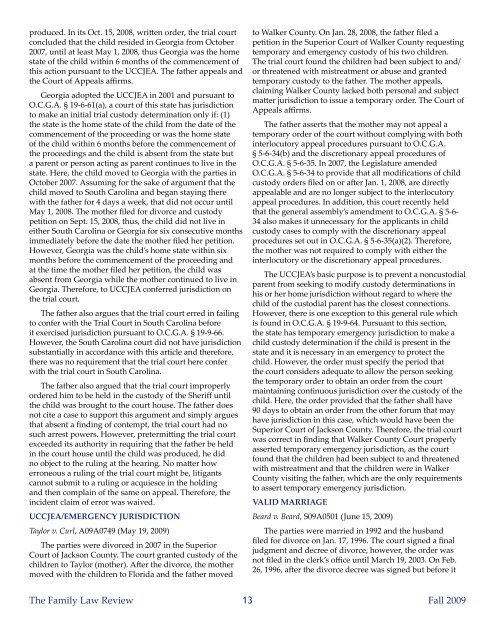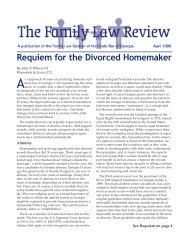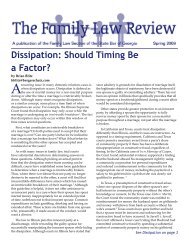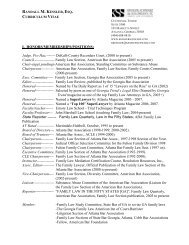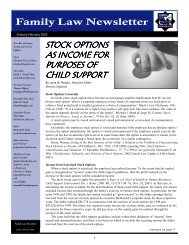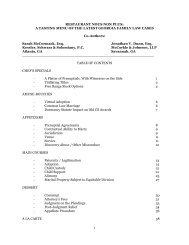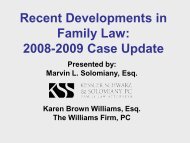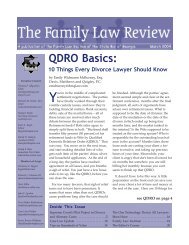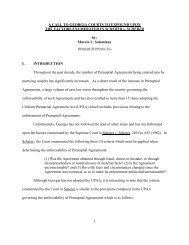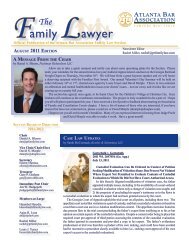Fall 2009 - Atlanta - Divorce Lawyer - Family Law - Atlanta Georgia
Fall 2009 - Atlanta - Divorce Lawyer - Family Law - Atlanta Georgia
Fall 2009 - Atlanta - Divorce Lawyer - Family Law - Atlanta Georgia
Create successful ePaper yourself
Turn your PDF publications into a flip-book with our unique Google optimized e-Paper software.
produced. In its Oct. 15, 2008, written order, the trial courtconcluded that the child resided in <strong>Georgia</strong> from October2007, until at least May 1, 2008, thus <strong>Georgia</strong> was the homestate of the child within 6 months of the commencement ofthis action pursuant to the UCCJEA. The father appeals andthe Court of Appeals affirms.<strong>Georgia</strong> adopted the UCCJEA in 2001 and pursuant toO.C.G.A. § 19-6-61(a), a court of this state has jurisdictionto make an initial trial custody determination only if: (1)the state is the home state of the child from the date of thecommencement of the proceeding or was the home stateof the child within 6 months before the commencement ofthe proceedings and the child is absent from the state buta parent or person acting as parent continues to live in thestate. Here, the child moved to <strong>Georgia</strong> with the parties inOctober 2007. Assuming for the sake of argument that thechild moved to South Carolina and began staying therewith the father for 4 days a week, that did not occur untilMay 1, 2008. The mother filed for divorce and custodypetition on Sept. 15, 2008, thus, the child did not live ineither South Carolina or <strong>Georgia</strong> for six consecutive monthsimmediately before the date the mother filed her petition.However, <strong>Georgia</strong> was the child’s home state within sixmonths before the commencement of the proceeding andat the time the mother filed her petition, the child wasabsent from <strong>Georgia</strong> while the mother continued to live in<strong>Georgia</strong>. Therefore, to UCCJEA conferred jurisdiction onthe trial court.The father also argues that the trial court erred in failingto confer with the Trial Court in South Carolina beforeit exercised jurisdiction pursuant to O.C.G.A. § 19-9-66.However, the South Carolina court did not have jurisdictionsubstantially in accordance with this article and therefore,there was no requirement that the trial court here conferwith the trial court in South Carolina.The father also argued that the trial court improperlyordered him to be held in the custody of the Sheriff untilthe child was brought to the court house. The father doesnot cite a case to support this argument and simply arguesthat absent a finding of contempt, the trial court had nosuch arrest powers. However, pretermitting the trial courtexceeded its authority in requiring that the father be heldin the court house until the child was produced, he didno object to the ruling at the hearing. No matter howerroneous a ruling of the trial court might be, litigantscannot submit to a ruling or acquiesce in the holdingand then complain of the same on appeal. Therefore, theincident claim of error was waived.UCCJEA/EMERGENCY JURISDICTIONTaylor v. Curl, A09A0749 (May 19, <strong>2009</strong>)The parties were divorced in 2007 in the SuperiorCourt of Jackson County. The court granted custody of thechildren to Taylor (mother). After the divorce, the mothermoved with the children to Florida and the father movedto Walker County. On Jan. 28, 2008, the father filed apetition in the Superior Court of Walker County requestingtemporary and emergency custody of his two children.The trial court found the children had been subject to and/or threatened with mistreatment or abuse and grantedtemporary custody to the father. The mother appeals,claiming Walker County lacked both personal and subjectmatter jurisdiction to issue a temporary order. The Court ofAppeals affirms.The father asserts that the mother may not appeal atemporary order of the court without complying with bothinterlocutory appeal procedures pursuant to O.C.G.A.§ 5-6-34(b) and the discretionary appeal procedures ofO.C.G.A. § 5-6-35. In 2007, the Legislature amendedO.C.G.A. § 5-6-34 to provide that all modifications of childcustody orders filed on or after Jan. 1, 2008, are directlyappealable and are no longer subject to the interlocutoryappeal procedures. In addition, this court recently heldthat the general assembly’s amendment to O.C.G.A. § 5-6-34 also makes it unnecessary for the applicants in childcustody cases to comply with the discretionary appealprocedures set out in O.C.G.A. § 5-6-35(a)(2). Therefore,the mother was not required to comply with either theinterlocutory or the discretionary appeal procedures.The UCCJEA’s basic purpose is to prevent a noncustodialparent from seeking to modify custody determinations inhis or her home jurisdiction without regard to where thechild of the custodial parent has the closest connections.However, there is one exception to this general rule whichis found in O.C.G.A. § 19-9-64. Pursuant to this section,the state has temporary emergency jurisdiction to make achild custody determination if the child is present in thestate and it is necessary in an emergency to protect thechild. However, the order must specify the period thatthe court considers adequate to allow the person seekingthe temporary order to obtain an order from the courtmaintaining continuous jurisdiction over the custody of thechild. Here, the order provided that the father shall have90 days to obtain an order from the other forum that mayhave jurisdiction in this case, which would have been theSuperior Court of Jackson County. Therefore, the trial courtwas correct in finding that Walker County Court properlyasserted temporary emergency jurisdiction, as the courtfound that the children had been subject to and threatenedwith mistreatment and that the children were in WalkerCounty visiting the father, which are the only requirementsto assert temporary emergency jurisdiction.VALID MARRIAGEBeard v. Beard, S09A0501 (June 15, <strong>2009</strong>)The parties were married in 1992 and the husbandfiled for divorce on Jan. 17, 1996. The court signed a finaljudgment and decree of divorce, however, the order wasnot filed in the clerk’s office until March 19, 2003. On Feb.26, 1996, after the divorce decree was signed but before itThe <strong>Family</strong> <strong>Law</strong> Review 13<strong>Fall</strong> <strong>2009</strong>


